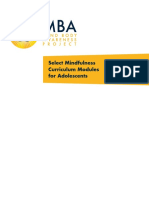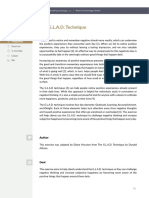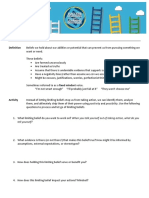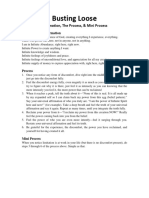Living in The Here and Now
Living in The Here and Now
Uploaded by
Kathryn RosypalCopyright:
Available Formats
Living in The Here and Now
Living in The Here and Now
Uploaded by
Kathryn RosypalOriginal Description:
Original Title
Copyright
Available Formats
Share this document
Did you find this document useful?
Is this content inappropriate?
Copyright:
Available Formats
Living in The Here and Now
Living in The Here and Now
Uploaded by
Kathryn RosypalCopyright:
Available Formats
Living in the Here and Now by Kathryn Rosypal Life seems to fly by so quickly that we can barely keep
up with it. Perhaps this is because, instead of living every moment and spontaneously enjoying it, we spend our years looking forward to lifes big events and just existing in between, as if the routine, inbetween moments dont really count. In his lecture on True Wealth, Goswami Kriyananda of the Temple of Kriya Yoga in Chicago, Illinois, said, Life is this moment. He goes on to say that the essence of life and true wealth are experiencing peace and tranquility in the here and now. A simple truth but a challenging task. The truly aware person understands that life is only this moment. The now is all we have. It is our current moment of awareness, which includes neither the past nor the future. The now is a point in time where all possibilities exist. If we allow ourselves to constantly focus on the shadows of the past and the hopes of the future, our awareness continues to fluctuate from past to future, back and forth, again and again. These mental fluctuations steal from us the present moment - the here and now! When we pour our energy into remembering what has happened to us in the past, we are automatically energizing those memories. This causes the same occurrences to project into our future, thus our lives are going in circles - or spirals at best. Have you ever tried to go for five minutes without thinking of the past or the future? Its quite a challenge, just as stopping all thoughts is difficult for the novice meditator. But it can be done. The past offers us a sense of security that makes us feel like we have some control over our life. The future offers us hope in its promise of better results. But what we dont realize is that our mental fluctuations drain enormous energy from us both physically and mentally. Our life becomes a world of illusions filled with actions and reactions that take up much of our waking day. Were exhausted and dont know why. The problem is elusive and the answer lies in changing our point of focus to the here and now. However, this is not easily done. When we live mostly in the future, our goal is to change the world, to make it a better place in which to live, to make our mark on the world. Thus, when we begin living in the present, we feel humbled and disappointed because we
realize that neither God nor the Universe is counting on us to change anything except ourselves - everything is exactly as it is meant to be. When we live in the past, we dwell upon injustices done to us and mistakes committed by us. When we suddenly change to here and now thinking, we become frustrated because we realize that we cant change whats done and we cant change other people. Zen philosophy aptly expresses this simple truth as What is, is. So, all we have is the now. As Buddha learned, when he meditated beneath the tree of knowledge for twenty-nine days, the key to life is balance, just to be. The only way we can just be is to become rootednot just temporarily planted, but deeply rootedin the here and now. The first step in learning to be in the present moment is to become aware of how often our mental projections revert into the past and the future. This is done through the Observer Technique. We can image a part of our consciousness standing about eighteen inches above and behind our right shoulder. This is the Observer - a totally nonjudgmental part of our self that watches what we think about as we go through our normal day. It is totally nonjudgmental. It is not allowed to praise not criticize - it just quietly observes us as an objective stranger would. The only comment the Observer is allowed to make is: Isnt that interesting for its job is just to observe our thoughts. At the end of each day, we can sit down with a tablet or journal and write in it what the Observed saw. What percentage of our day was spent in thoughts of the past? What percentage was spent in the future? Did we spend most of our time fluctuating between past and future? Was any time spent with our total focus in the present? If so, how did it feel? This journaling - reviewing our day for the purpose of learning from it, and writing down our observations before going to sleep - is very important is helping us to change our thinking. It keeps track of our progress and acts as a simple reminder every night that we choose to live in the present moment. Our mind then holds this thought while we are falling asleep, which energizes the thought and brings increased focus to our goal during the next day. In this way, the Observer technique, combined with journaling, will enhance our ability to stay focused in the present. As we go about our day, whenever we notice our thinking straying to the past or the future, we can gently bringing our awareness back to the present by saying the Sanskrit
words, Neti, neti, neti. We use a Sanskrit word because Sanskrit is one of the three sacred languages of the world - a language used strictly for religious services - similar to the way only Latin was used in the Catholic church for religious services for centuries. It means I am not this thought, I am not that thought, I am not thought. If we use an English word, such as peace, it automatically conjures up pictures and associations from our past. For example, based upon my experience peace might conjure up a Volkswagen bus with a peace sign painted on it and hippies hanging out the windows waving their hands in the peace gesture. This would then make me think of the Viet Nam War and the soldiers I used to correspond with who were killed in action. This thought would make me wonder about the men who returned from the war and the train of thought would go a never-ending tangent. But I have no history with the Sanskrit word Neti. It does not conjure up any pictures or associations. This is why Sanskrit words can be powerful tools in helping us to focus our mind and change our thinking. In order to live in the present, we need to shift our awareness to understand that we can make use of no time except the present time - past and future do not exist in the now. They are not real. When we daydream about the future, we are wasting our present energy on unreality, we are wasting the current moment and setting up expectations for the future, which is not wise. Does this mean we cant make plans for the future? No, it just means we should plan plans, not results. Plan what we will do, but dont have expectations about how it will turn out. Enjoy the spontaneity of the current moment and let that determine how things will turn out. Live life in the here and now. Our concept of now can be this moment, hour or day. By living one hour at a time, or one day at a time, life becomes simpler and we retain more mental and physical energy which can be used right here and now to improve our life. Improving our life becomes easier, too, when we are rooted in the present because all we need to be concerned about is doing the next right thing, which automatically improves our future. A subtle change takes place and instead of feeling like we are striving to improve, we are actually improving one moment at a time. Living is the here and now will create a great degree of peace, serenity and tranquility in our life. Although the process of living in the present moment requires vigilance,
patience and constant self-awareness to achieve, it will give us with a feeling of contentment and sense of fulfillment that is well worth the challenge. The reason now is called the present is because it is a gift that we have been given by the Universe to do with what we will. It is also our gift to give to others. Let us use it wisely.
You might also like
- Zsofi PostsDocument448 pagesZsofi PostsSimon Torres100% (1)
- Psychiatric and Mental Health Nursing Exam Blueprint Forspecialist & Advanced Nurse SpecialistDocument1 pagePsychiatric and Mental Health Nursing Exam Blueprint Forspecialist & Advanced Nurse SpecialistZaid MarwanNo ratings yet
- BIPOLAR - Mood Thermometer With Monitoring CardDocument6 pagesBIPOLAR - Mood Thermometer With Monitoring Cardathina karavolNo ratings yet
- MBA Sample ModulesDocument36 pagesMBA Sample ModulesNatales84No ratings yet
- Curriculum Development For Medical EducationDocument368 pagesCurriculum Development For Medical EducationMuhammed Elgasim93% (15)
- Positive Thinking FinalDocument23 pagesPositive Thinking Finalnitin21822100% (1)
- Extinguish BurnoutDocument6 pagesExtinguish BurnoutJenniferNo ratings yet
- Spititual Learning Vispi RatoodDocument2 pagesSpititual Learning Vispi Ratoodcherylan100% (1)
- HOW TO OVERCOME FEAR WORRY STRESS ANXIETY and DEPRESSIONDocument141 pagesHOW TO OVERCOME FEAR WORRY STRESS ANXIETY and DEPRESSIONashish692No ratings yet
- Strengths Profile DefinitionsDocument2 pagesStrengths Profile DefinitionsSodfa EttafakshiNo ratings yet
- A Constant Self-GrowthDocument4 pagesA Constant Self-Growthgoldenbranch100% (1)
- Manage Your Life, Not A List Use Life Management Skills To Maximize Your TimeDocument3 pagesManage Your Life, Not A List Use Life Management Skills To Maximize Your TimeGrace Herdiyanti100% (1)
- 02 Your Beliefs and Self EsteemDocument11 pages02 Your Beliefs and Self Esteemjake100% (2)
- The Nature of The Human EgoDocument18 pagesThe Nature of The Human EgobanarisaliNo ratings yet
- Law of ReactionDocument5 pagesLaw of ReactionKarthik Reddy100% (1)
- HowtoMotivatePeople MindmapDocument1 pageHowtoMotivatePeople MindmapKris100% (1)
- Meditation (Dhyana) : Kularnava TantraDocument3 pagesMeditation (Dhyana) : Kularnava Tantraviky24No ratings yet
- The GLAD TechniqueDocument7 pagesThe GLAD Techniquegord42No ratings yet
- Increasing Access and Self-Help in CBTDocument9 pagesIncreasing Access and Self-Help in CBTLucas SNo ratings yet
- Identity and SelfDocument30 pagesIdentity and Selfrajeev_khanna_15No ratings yet
- The Ultimate Creator Is The Human Mind. - H.H. Dalai LamaDocument5 pagesThe Ultimate Creator Is The Human Mind. - H.H. Dalai Lamacchlomas4269No ratings yet
- Meditation Mastery: Embrace Mindfulness To Transform Your LifeDocument58 pagesMeditation Mastery: Embrace Mindfulness To Transform Your LifeAditya trimukheNo ratings yet
- 7 Secrets of SuccessDocument5 pages7 Secrets of SuccesssubeeshupNo ratings yet
- Action PLanning Pitstop SELDocument2 pagesAction PLanning Pitstop SELSven LungNo ratings yet
- Summary BooksDocument40 pagesSummary BooksmoizNo ratings yet
- Positive ThinkingDocument3 pagesPositive ThinkingmknoorcmaNo ratings yet
- Daily Affirmations: 1.) I Believe in MyselfDocument1 pageDaily Affirmations: 1.) I Believe in Myselfmd91101100% (1)
- Dominate Conquer Your Fears Become The Man You Want To BeDocument53 pagesDominate Conquer Your Fears Become The Man You Want To BeAnonymous sId0uhkEIVNo ratings yet
- Melinda Smith, M.A., Lawrence Robinson, and Jeanne Segal, PH.D, Sehar Shoukat, Sophia, Sarah, John M. Grohol, Psy.DDocument5 pagesMelinda Smith, M.A., Lawrence Robinson, and Jeanne Segal, PH.D, Sehar Shoukat, Sophia, Sarah, John M. Grohol, Psy.DZhang PeilinNo ratings yet
- Being IndependentDocument4 pagesBeing IndependentColeen gaboyNo ratings yet
- NEW Chapter 24 Work It Out With Your Best FriendDocument37 pagesNEW Chapter 24 Work It Out With Your Best Friendpopetto100% (1)
- "Apart of Good Leader" Istanbul Aydin University, Istanbul MBADocument25 pages"Apart of Good Leader" Istanbul Aydin University, Istanbul MBAWaqas AzeemNo ratings yet
- 12 Concentration Exercises From 1918Document16 pages12 Concentration Exercises From 1918Luka GustinNo ratings yet
- Hpa 6questionsDocument1 pageHpa 6questionsCarmenLarisaNo ratings yet
- OVERCONFID 10 Tips For Overcoming Low Self-EsteemDocument9 pagesOVERCONFID 10 Tips For Overcoming Low Self-EsteemluizdasilvaazevedoNo ratings yet
- UHV MergedDocument212 pagesUHV MergedYash KadamNo ratings yet
- By Carol S. Dweck, Stanford University: Mindsets: Developing Talent Through A Growth MindsetDocument6 pagesBy Carol S. Dweck, Stanford University: Mindsets: Developing Talent Through A Growth Mindsetpaula100% (1)
- Limiting Beliefs 0Document2 pagesLimiting Beliefs 0Sivaraman VenkatesanNo ratings yet
- Self Discovery - Power of The MindDocument41 pagesSelf Discovery - Power of The Mindowale-karigidi.2303916No ratings yet
- Action Planning Pitstop 2: Managing Emotions in Times of Uncertainty and StressDocument3 pagesAction Planning Pitstop 2: Managing Emotions in Times of Uncertainty and StressAngel FeresiaNo ratings yet
- PART 3 Make Them ObsessedDocument5 pagesPART 3 Make Them Obsessedblueberry.11No ratings yet
- Ken-Druck-self Care - BKDocument12 pagesKen-Druck-self Care - BKFero TonNo ratings yet
- Jump To The Quotes You're Looking For NowDocument77 pagesJump To The Quotes You're Looking For NowFe GregorioNo ratings yet
- Intervention Protocol Emotion JengaDocument13 pagesIntervention Protocol Emotion Jengaapi-363875787No ratings yet
- Self-Care PowerpointDocument17 pagesSelf-Care PowerpointJessa C. RamosNo ratings yet
- Certification Course: TruthDocument3 pagesCertification Course: TruthEddy PopescuNo ratings yet
- Ei For TeachersDocument17 pagesEi For TeachersNeena PrasadNo ratings yet
- PowerPoint #3 - Self-Concept & Identity ManagementDocument16 pagesPowerPoint #3 - Self-Concept & Identity ManagementBrayden KeisterNo ratings yet
- Practicing Mind Over Matter: Dr. Murali Krishna On Relaxation Techniques To Improve Employee ProductivityDocument1 pagePracticing Mind Over Matter: Dr. Murali Krishna On Relaxation Techniques To Improve Employee ProductivityVibrant: To Heal and Be Whole (Book)No ratings yet
- The Power of Now by Eckhart TolleDocument1 pageThe Power of Now by Eckhart TolleHenk Van DamNo ratings yet
- Wellness Habits: If You Want To Be HappierDocument18 pagesWellness Habits: If You Want To Be HappiersuprabhattNo ratings yet
- Motivation: My Secret To Permanent Weight Loss: Think and FeelDocument5 pagesMotivation: My Secret To Permanent Weight Loss: Think and FeelOS CorneliusNo ratings yet
- How To Keep A Mental Health, Stay Motivated and Move ForwardDocument12 pagesHow To Keep A Mental Health, Stay Motivated and Move Forwardmyapplestyle3199No ratings yet
- Concept Notes - Webinar On Gender Based ViolenceDocument4 pagesConcept Notes - Webinar On Gender Based ViolencecarenNo ratings yet
- Belief Harmony WorksheetDocument8 pagesBelief Harmony WorksheetAreeba AslamNo ratings yet
- The Science Behind What Makes Us HappyDocument2 pagesThe Science Behind What Makes Us HappyIsabel SeabraNo ratings yet
- Busting Loose Affirmation Process Mini ProcessDocument2 pagesBusting Loose Affirmation Process Mini ProcessastrakoNo ratings yet
- 20 Critical Things You Should Never TolerateDocument3 pages20 Critical Things You Should Never TolerateropesNo ratings yet
- 16 Limiting Beliefs That Are Preventing You From Thriving Author Tony RobbinsDocument24 pages16 Limiting Beliefs That Are Preventing You From Thriving Author Tony Robbinssam100% (1)
- Fuedal Europe Unit PlanDocument6 pagesFuedal Europe Unit Planapi-315579642No ratings yet
- Critical ThinkingDocument8 pagesCritical ThinkingSarah NaderNo ratings yet
- Journal of Interprofessional Education & Practice: Kristine Wood, Carolanne CariniDocument4 pagesJournal of Interprofessional Education & Practice: Kristine Wood, Carolanne CariniNatalia BettancourtNo ratings yet
- MBA402 T3 2019 Assessment 2 OutlineDocument5 pagesMBA402 T3 2019 Assessment 2 OutlinePooja Nikunj AgarwalNo ratings yet
- AOTA Occupational Profile TemplateDocument2 pagesAOTA Occupational Profile TemplateYayan100% (1)
- El - Cuadro - de - Mando - Integral - Aplicado - A Gestion Activos PDFDocument55 pagesEl - Cuadro - de - Mando - Integral - Aplicado - A Gestion Activos PDFGerardo MartinNo ratings yet
- MGT 351 UCB BankDocument16 pagesMGT 351 UCB BankRashikNo ratings yet
- Break-Out Plan 3 Annika DesandoDocument2 pagesBreak-Out Plan 3 Annika Desandoapi-583779875No ratings yet
- 3rd WeekDocument3 pages3rd Weekmanejarosilyn86No ratings yet
- APUSH Inside-Outside-Inside Discussion InstructionsDocument2 pagesAPUSH Inside-Outside-Inside Discussion InstructionscrolwesNo ratings yet
- Iplan Math3 Quarter1 Week4 Lesson1Document3 pagesIplan Math3 Quarter1 Week4 Lesson1CRISTILE ANN GESMAN100% (1)
- JB Core Reflections 2Document3 pagesJB Core Reflections 2api-642676232No ratings yet
- TOK Essay Interaction FormDocument2 pagesTOK Essay Interaction FormbillssrNo ratings yet
- The Differences Between OHS Management System StandardsDocument27 pagesThe Differences Between OHS Management System StandardsRommel100% (2)
- Article Refrences..Document13 pagesArticle Refrences..Amatul MusawarNo ratings yet
- MGT112-Ch1-Introduction To The Field of Organizational Behavior-1OBDocument26 pagesMGT112-Ch1-Introduction To The Field of Organizational Behavior-1OBDrJaber NapesterNo ratings yet
- Chapter 2Document34 pagesChapter 2Leo SindolNo ratings yet
- Eve Lorgen - Trauma Based Mind ControlDocument3 pagesEve Lorgen - Trauma Based Mind ControlEU-MindControl67% (3)
- Didactic UnitDocument12 pagesDidactic UnitEddy Salgado100% (1)
- MC Kinsey 7S Model & Its Implementation in InfosysDocument24 pagesMC Kinsey 7S Model & Its Implementation in Infosysram gopal90% (21)
- Module 5 Arguments and FallaciesDocument3 pagesModule 5 Arguments and FallaciesNiger Rome100% (1)
- 5 Points 4 Points Peer Edit With Perfection! Tutorial Peer Edit With Perfection! Worksheet Answer Key Peer Edit With Perfection! HandoutDocument4 pages5 Points 4 Points Peer Edit With Perfection! Tutorial Peer Edit With Perfection! Worksheet Answer Key Peer Edit With Perfection! HandoutwolfbeardNo ratings yet
- Cultural PatternDocument36 pagesCultural PatternchongNo ratings yet
- Gec 4 FinalsDocument2 pagesGec 4 FinalsPearl OgayonNo ratings yet
- Effects of Domestic Violence On Young People in Family Setting: Evidence From Omu-Aran, Kwara State, NigeriaDocument9 pagesEffects of Domestic Violence On Young People in Family Setting: Evidence From Omu-Aran, Kwara State, Nigeriarobert0rojerNo ratings yet
- HistoryofreadingDocument10 pagesHistoryofreadingapi-305248498No ratings yet
- People's Voluntary Outrageous Slavery in Harlan Ellison's Story: An Imitative Theme AnalysisDocument7 pagesPeople's Voluntary Outrageous Slavery in Harlan Ellison's Story: An Imitative Theme AnalysisJan PintacNo ratings yet
- Paper Presentation - Doc NewDocument12 pagesPaper Presentation - Doc NewMontu DaveNo ratings yet
- Module 1 AssessmentDocument3 pagesModule 1 AssessmentmoreNo ratings yet

























































































